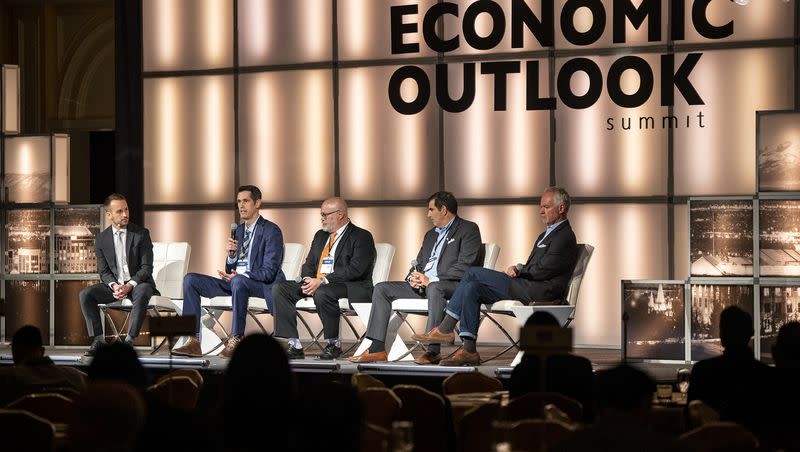Opinion: The stalled trade program costing Utah millions

In the 1800s, Utah’s economy was so disconnected from global markets that households were encouraged to make and sell homemade products with the goal of replacing “almost every article of imported goods” coming from outside the territory. The policy was driven in part by necessity but also by a desire to preserve scarce capital from being spent abroad.
Before long, the arrival of the railroad and the overall industry of Utah’s population rendered this home manufacturing policy unnecessary, and in due course, the economy boomed. Today, Utah has integrated into the global marketplace and boasts one of the most diverse economies in the U.S.
Despite this progress, ineffective trade policies still hold us back, sometimes quite needlessly. Take for example a federal trade policy called the Generalized System of Preference (GSP). It is, perhaps, the most impactful U.S. government trade program you’ve never heard of.
This bipartisan program is supposed to let U.S. manufacturers import freely from developing economies that are friendly to, and strategic for, the U.S. To protect U.S. manufacturers, many goods that are commonly made in the U.S. do not receive this duty-free treatment. In this way, the GSP program simultaneously protects U.S. manufacturing while incentivizing imports that are strategic.
GSP has been around for approximately 50 years. However, on Jan. 1, 2021, Congress allowed the GSP program to lapse, putting these duty-free trade benefits on hold. Its renewal, despite being favored by a bipartisan majority, has simply not been the priority it ought to be. As a result, for three years, the U.S. government has held approximately $3.25 billion in escrow from importers, which is earmarked to be refunded upon the program’s renewal. A multi-billion-dollar infusion into our economy is sorely needed.
Utah companies continue to pay tariffs each month on imports from GSP-eligible countries, hoping these costs, which now total $26 million, will be refunded upon program renewal. These tariffs have impeded growth and profitability for businesses in our state — two vitally important issues for World Trade Center Utah.
WTC Utah helps to drive new, global business to Utah companies and the state, and our team is heavily focused on strengthening Utah’s business connections with our trade allies around the world. In addition to partnering with the Governor’s Office of Economic Opportunity to organize governor-led trade missions abroad, we connect Utah companies to global opportunities through our robust network, international programs and business services.
Related
Last month, WTC Utah hosted Esteban Moctezuma Barragán, Mexico ambassador to the U.S., in Salt Lake ahead of the governor-led trade mission to Mexico City and Monterrey the following week. The visit and mission build upon groundwork for an increase in collaboration and economic opportunities. Additionally, as the U.S. Small Business Administration’s state administrator for the State Trade Expansion Program (STEP) Grant, we can help companies throughout the state to catalyze their global growth — a win for all Utahns.
Renewing the GSP program is at the forefront of our priorities. We firmly believe it holds immense potential to benefit Utah businesses and offers some relief for residents fighting inflation that is exacerbated by unnecessary tariffs. According to the Coalition for GSP, Utah importers have paid approximately $237 million on GSP-eligible shipments in the past three years. Until the program is reinstated, these additional costs will either be absorbed by the businesses — or more likely, passed along to consumers.
Several prominent organizations in Utah are impacted by the lapse of GSP and are advocating for its renewal, including Black Diamond Equipment, Downeast Outfitters, Malouf Companies, and Niagara Bottling. These companies collectively employ thousands of Utah residents and contribute to our state through their exceptional products and services.
Black Diamond Equipment, a global outdoor industry leader, had the unique opportunity to testify before a September trade subcommittee hearing on GSP, hosted by the House Ways and Means Committee. Black Diamond Equipment shared that the outdoor industry alone has been impacted by the GSP non-renewal by more than $1.65 billion in tariffs. Black Diamond also encouraged the committee to make updates to the GSP program, which are being championed by Utah Rep. Blake Moore.
Moore, who became a member of the powerful Ways and Means Committee in January, is working closely with his fellow committee members for the renewal of GSP and introducing a standalone bill that will modernize the program. These congressional initiatives will benefit both domestic and foreign producers while strengthening strategic alliances globally.
We need Congress to swiftly pass a long-term, retroactive GSP reauthorization — until they do, Utah consumers and businesses will continue to bear the financial burden.
Jonathan Freedman is the president and CEO of World Trade Center Utah . Troy Keller is a partner at Dorsey & Whitney and international trade and commercial policy advisor for World Trade Center Utah.

